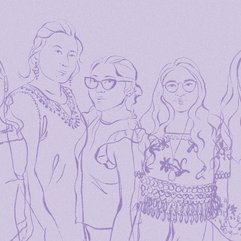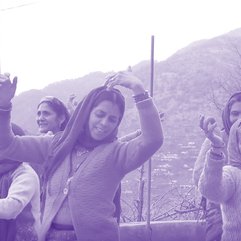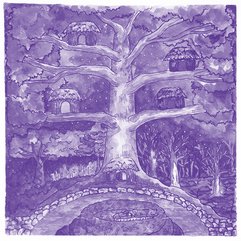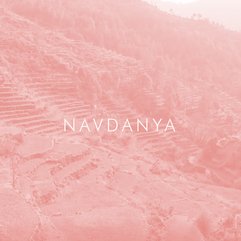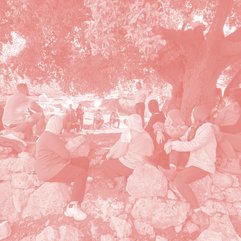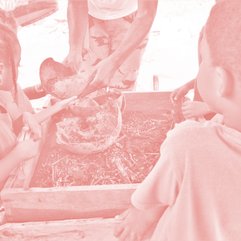Kontinuierliche Gegenwart: Zu Palästinensischer Arbeit, Land und Wirtschaft
Es handelt sich um ein zweitägiges Symposium über die politische Ökonomie Palästinas und den Wiederaufbau des Gazastreifens
10.00-21.00
10.00-21.00
Termin speichern
für Kinder ab 14 Jahren und Erwachsene
auf Englisch

Inmitten von 20 Monaten Bombardierung und anhaltender völkermörderischer Gewalt gegen Palästinenser*innen in Gaza will sich dieses zweitägige Symposium kritisch mit der politischen Ökonomie Palästinas auseinandersetzen, sowie der gewalttätigen Imagination einiger der vorgeschlagenen Wiederaufbaupläne für Gaza.
Present Continuous erforscht die gegenwärtigen Realitäten des Bulldozer-Kapitalismus: wo Immobilienspekulation, Landzerstörung, technozentrische Planung und die völkermörderische Logik des Siedlerkolonialismus zusammenkommen. Indem diese Muster der Kapitalakkumulation nachgezeichnet werden, wird das Symposium versuchen zu klären, wie dadurch das Erbe der kolonialen Herrschaft und die wirtschaftliche, räumliche Kontrolle über Menschen, Land und Ressourcen in Palästina erweitert wird. Das Programm wird die Teilnehmer*innen dazu einladen, über die Rolle internationaler Akteur*innen - einschließlich westlicher Staaten - nachzudenken: Diese strukturieren sowohl historische als auch gegenwärtige Dynamiken in der Region durch seit langem bestehende Strukturen der Ausbeutung, der Rückentwicklung der palästinensischen Industrie und landwirtschaftlichen Produktion sowie der Militarisierung strukturieren.
In Panels, Workshops und künstlerischen Interventionen bietet Present Continuous den Raum, um zu diskutieren, wie die Prismen Land, Arbeit, Industrie, Energie und Infrastruktur uns helfen können, die wirtschaftliche Architektur der Besatzung im vergangenen Jahrhundert zu verstehen – und gleichzeitig zu reflektieren, wie diesen Logiken wirtschaftlicher Beherrschung widerstanden wurde. Um sie schließlich für eine alternative Zukunft neu zu denken.
Menschen mit unterschiedlichem Hintergrund sind herzlich eingeladen, an dem Symposium teilzunehmen.
Das Symposium wird organisiert von Jule Ulbricht und Gale Raj.

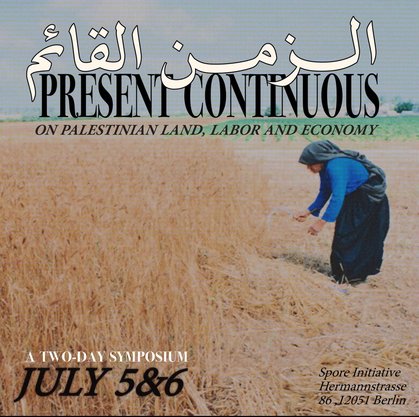
Day one: Saturday, 5 July 2025
10:00 am Opening Notes
by Mohammed Abdallah and Jule Ulbricht
10:30 am Panel
Imperial Continuum: Palestine and the Region
with Sherene Seikaly and Raja Khalidi, moderated by Lama El Khatib and Joud Al Tamimi
How can we understand Palestine within a larger history and infrastructure of imperial formations? How have forms and practices of popular sovereignty persisted against the mechanisms and claims of totalizing imperial powers? At this conjuncture of ongoing genocide in Gaza and expanding extraction of land and resources in Palestine, this panel attempts to think and rethink the political economy of imperial investment in Palestine and its surrounding region as well as present and potential modalities of anti-imperialist organizing.
12:00 pm Lunch
Cooking in Gaza under Genocide A Resistance of Flame and Fragrance
with the Palestinian Cooking Club
In Palestine, the kitchen has become more than a place of nourishment—it is a battlefield of memory, survival, and resistance. Under the shadow of genocide, where homes are reduced to rubble and families fragmented, the simple act of cooking takes on extraordinary meaning. Recipes passed through generations are preserved not only in taste, but in the courage of those who continue to prepare them amidst blockade, bombardment, systematic starvation and grief.
2:00 – 4:30 pm Working Sessions
Unpacking Energy Imperialism
by WeSmellGas, Global South United & Klima4Palästina
This workshop explores energy imperialism and its intersections with climate justice, racial capitalism, and Palestine. Together, we will reflect on how fossil fuel extraction, militarized infrastructure, and corporate complicity—such as by Siemens and Allianz—tie into global systems of oppression, from the Gulf to Palestine. The session will begin with a collective reading and discussion, followed by a historical overview and an activist-led fishbowl conversation.
2:00 – 4:30 pm Working Sessions
Learning from and with the Palestinian Diaspora in Berlin: Labor, Power, and Organizing
Together, we will explore the histories and ongoing realities of Palestinians in Berlin, with a focus on labor, resistance, and organizing. We will trace the various waves of Palestinian migration to Germany and the shifting contexts of pro-Palestine mobilization, highlighting how anti-Palestinian repression is far from new. Practices such as surveillance, censorship, deportations, bans on assemblies, and the dissolution of student networks have long been present in Germany, and learning from and with those who’ve experienced them before is crucial for understanding where we stand today, and for working towards a more inclusive and grounded form of solidarity.
4:30 Break
5:00 pm Panel
Political Economy of the Reconstruction Plans and Notes Towards Palestinian Liberation
with Nora Ragab (Palestine Speaks), Kareem Rabie, Mandy Turner and Mezna Qato, moderated by Sobhi Samour
7:15 pm Study Session
Unsettled Earth, Study Session with Joud Al Tamimi and Lama El Khatib
Rooted in collaborations with grassroots agrarian initiatives and collectives in Palestine organizing around defense of land, communal autonomy, and ecological recovery, Unsettled Earth explores practices and infrastructures that construct relations of land and life anew amid ongoing settler-colonial violence and ecological catastrophe. This study session will engage selected works from the exhibition connecting to the questions posed by Present Continuous at the intersection of Palestinian land, political economy, and labor.
9:00 pm Closing
Day two: Sunday, 6 July 2025
11:00 am Panel
On Palestinian Land & Labor
with Faiq Mari, Riya al’Sanah (Workers in Palestine), and Sai Englert, moderated by Jule Ulbricht
The intertwined struggles for land and labor have been inseparable from Palestinians resisting the long arc of settler colonialism and the shifting terrain of class politics.
We ask how Palestinians confronted Israel’s racialized labor hierarchy: from early Labor Zionism’s strategies of “conquest of land/ labor”, the 1970s influx of migrant workers to the current condition of surplus labor through work permit regime and incarceration as “counterinsurgency”.
Anchored in revolutionary tradition – from fida’i movements, Intifada collectives to today’s cooperatives – we situate the Palestinian struggle within a longer historical trajectory of agrarian movements and working-class politics. We examine strikes as well as global workers solidarity as both inheritance and necessity, confronting the strategic challenges of settler-colonial capitalism and the inseparability of people’s and land’s liberation.
12:30 pm Lunch
Cooking in Gaza under Genocide: A Resistance of Flame and Fragrance
with the Palestinian Cooking Club
In Palestine, the kitchen has become more than a place of nourishment—it is a battlefield of memory, survival, and resistance. Under the shadow of genocide, where homes are reduced to rubble and families fragmented, the simple act of cooking takes on extraordinary meaning. Recipes passed through generations are preserved not only in taste, but in the courage of those who continue to prepare them amidst blockade, bombardment, systematic starvation and grief.
2:30 – 4:00 pm Working Sessions
Iran Contra English
For the past twenty months, Benjamin Netanyahu has signed off his video addresses to the people of Iran with “Woman, Life, Freedom.” At the instance when the first Israeli bomb dropped on Iran, previous modes of expression, semiotics, rhetoric, and discourse for Iranians in the English language were foreclosed. What can be translated about Iran to English, in 2025, that is not at once captured and reified as military hardware? With the regime of rights at its final whisper, the institution of human rights revealed as a staunch culprit of genocide and war, the veil is lifted once and for all on the absence of this English-speaking addressee. This conversation invites those in diaspora and exile—particularly Iranians—to reflect on the question of appropriation and co-optation radically and militantly anew. The urgency of foreign invasion calls for radical strategies, tactics, and tools to resist and reverse the expropriation of the just and liberatory struggles and movements inside Iran and the MENA region. A consciousness around the political economy of language as media, and the grounds on which translation takes place, may be a starting point.
2:00 – 4:30 pm Working Sessions
Colonial Continuities: British Mandate Policies and the Foundations of Resource Extraction in Palestine
This workshop examines how British Mandate-era governance (1917–1948) laid the foundations for an extractive regime in Palestine. Through land laws, infrastructure concessions, and labor segregation, Britain institutionalised a colonial economy that prioritized Zionist interests and resource control. After a concise historical input, participants will engage with archival documents—land reports, energy concessions—to trace how legal frameworks enabled dispossession. By mapping continuities from colonial railroads to modern gas fields and fragmented energy access, the session reveals today’s energy imperialism as an extension of British-designed systems of domination.
2:00 – 4:30 pm Working Sessions
Cartographies of Reconstruction: Remittance Routes from Berlin to Gaza
by Academic Opposition and Bard College Berlin students
This workshop explores the personal and political geographies of remittances sent from Berlin to Gaza. As formal money transfer routes, upon which many families in historic Palestine rely, have been obstructed and impeded by Israel, as another means of daily harassment and international isolation, Palestinians in Berlin have had to navigate alternative routes to support reconstruction efforts back home. Together, we will map these remittance pathways as a communal practice – tracing both material flows and the settler colonial barriers that obstruct them. Through collective mapping, we will reflect on how these acts of care and resistance contribute to visions of reconstruction rooted in solidarity and shared struggle.
4:00 pm Panel
Weapons, High-Tech, and Genocide in Gaza
with Hebatalla Taha, Dimitra Andritsou (Forensis/ Forensic Architecture), and Nabil Hamdan (Academic Oposition), moderated by Gale Raj
Germany has been the second largest weapons exporter to Israel for decades. This panel will discuss the complicity by German companies and the German government to the genocide in Gaza by exposing the growing and clandestine arms trade between Germany and Israel and increasing publicly funded and thereby normalization of weapons research in German universities. This will be connected to the growth of the high-tech industry in Israel and its links to the military and technologies of war, occurring through the exploitation of Palestinian labor.
5:30 pm Break
6:00 pm Panel
Occupation by Infrastructure: Extractivism and the Fight for Energy Sovereignty in Palestine
with Munira Khayyat, Omar Jabary Salamanca, Mohammed Usrof, moderated by Baldeep Kaur
This panel confronts the violent role that infrastructure plays under Israeli settler colonialism, namely on how systems of energy, water, and resource extraction are used to dominate, fragment, and dispossess the Palestinian people. By focusing on the built environment and the invisiblised networks of power and resource flows, the presentations challenge conventional understandings of occupation by interrogating the role of regional actors and the embeddedness of Israel in imperialist logistical circuits. It asks: how do infrastructures become weapons of war and mechanisms of apartheid? How can landscapes devastated by settler colonialism and extraction be liberated and rebuilt? Finally, what forms of resistance—technical, political, and ecological—are emerging to counter these extractive logics?
7:30 pm Closing remarks by Toufic Haddad
8:00 pm “Dreamscape”: Screening of short films
by students from Al-Quds Bard College and Bard College Berlin
9:00 pm Closing




